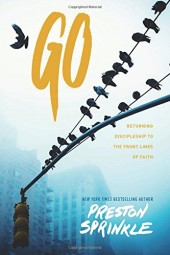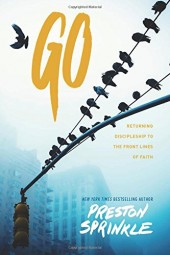
With wit and clarity, in his new release Go: Returning Discipleship to the Front Lines of Faith (NavPress, 2016) Preston Sprinkle argues that we have lost touch with what Biblical discipleship is all about. Vice President at Eternity Bible College (Boise Campus) as well as a bestselling author and speaker, Sprinkle’s dedication to Scripture is evident on every page of this book, as well as his his passion for Christ and the Church. Drawing from various studies as well as the stories of many Christians, he labors to provide an overall portrait of the America church in regards to discipleship. And the picture he paints is not a pretty one.
“While many Christians say they want to become more like Jesus, the Jesus they’re imagining is largely a modern (and American) [Jesus]” (p. 4).
Though some churches may be convinced of the effectiveness of their discipleship programs based on the numbers, Sprinkle points out that the numerical growth of many churches happens only because Christians leave another church and join theirs, not because non-Christians are being converted. Opposing “one-size-fits-all discipleship programs” (p. 91), he posits that we need to return to Scripture with fresh eyes and re-learn what discipleship according to the New Testament (NT) entails.

A Plea for Holistic Thinking
Discipleship (or becoming like Jesus, his definition) is actually really simple, Sprinkle argues; it’s we who have muddied the waters. We’ve made discipleship about church programs or Bible studies (which Sprinkle never downplays) but we’ve forgotten that discipleship is actually incorporated into all of life (it’s holistic) and not just in the “spiritual” things we do.
That the American church is plagued by a deep dualism is an underlying argument throughout the whole book, a dualism which separates ‘secular’ from ‘sacred.’ It’s when we look at discipleship through this lens that we make it about certain activities instead of all of life. Ultimately this dualism is man’s addition to the Bible and is not a help but a hindrance to true and organic discipleship, standing in the way of us participating in the true kind of discipleship that Jesus prescribed.
He pleads that we “move beyond thinking of discipleship in terms of how many hours we spend doing church activities and engaging in spiritual alone time;” that “When your entire vocation is viewed as mission, there are very few hours that aren’t discipleship” (p. 77). He believes that only a number of Christians think of discipleship holistically, “where we become like Christ in the way we think about art, beauty, economics, immigration, and science (among other things)” (p. 77).
A plea for Creativity
Though, as already noted, Western Christians seem to have made discipleship solely about church programs, throughout the book many stories are shared of Christians who do discipleship in unorthodox ways (not the “normal” or “expected” ways). Some Christians may not be able to fathom that these unorthodox ways are discipleship because they think of only Bible studies (and/or “spiritual” things) as discipleship. This is because of the secular/sacred divide noted already, but also because we don’t seem to allow for creativity in how we disciple.
Based on a recent in-depth study, Sprinkle believes that “many people would not leave the church if the church was doing a better, more holistic, and more creative job at discipling its people” (p. 13). (This is not coming from some hippie liberal Christian-no offense if that’s you-but from the guy who runs one of Francis Chan’s colleges.) Of course I can already hear the objections to this statement; “If they were Christian they wouldn’t have left the church in the first place.” But this is a great generalization and oversimplification which tends to excuse inexcusable behavior from fellow Christians. I’m grateful Sprinkle seems to realize this.
A Plea for True Community
In ch. 3 he emphasizes the essential aspect of community if we’re going to become like Christ. Noted is the fact that many who have left the church express that ‘community’ is the very thing they yearned for and the very thing that was lacking from churches in their experience. Sprinkle stresses that we cannot become like Christ in isolation, that to become like Jesus we need “Authentic relationships. Relationships where people can share their intimate struggles, confess their socially unacceptable sins, and rely on others for spiritual strength. But these types of relationships are fairly rare among Christians” (p. 42).
“Relationships where people can share their intimate struggles, confess their socially unacceptable sins, and rely on others for spiritual strength…are fairly rare among Christians.”
A Plea for Christians to think (for themselves)
Emphasizing the need for the church to create a safe atmosphere for discussion, Sprinkle writes “We can’t be scared of hard questions, and we need to stop giving prepackaged, canned responses to complex issues” especially since “one of the biggest complaints about Christians, especially from younger people, is that we are too scared or ill-equipped to think through the tough questions of the day. …we keep regurgitating dogmatic answers to complex questions… And many people are fleeing our churches because of it” (p. 105).
Devoting a large word count to the Christian and his/her vocation, he informs us of a study which reveals that 51% of youth teens hope to work in science-related fields and yet (in this study) in the course of a year only 1% of youth pastors discussed science in relation to faith. Sprinkle attributes this silence to fear, as “many churches tend to demonize the sciences for fear that Christians will lose their faith and become evolutionists.” But he insists that “the church should not be fearful of science; rather, it should learn how to thoughtfully engage the scientific world around it—a world that many of its members will be living in” (all on p. 79).
He stresses the need for churches to create space for healthy discussion and yes, even disagreement, insisting that “One’s interpretation of Genesis 1-2 does not have to be a gospel issue” and that “churches need to resist being controlled by fear-driven rhetoric and…explore ways in which they can nurture and train people to think critically about matters of faith and science. If the church doesn’t do it, the university will” (all on p. 80).
A Plea for a “Multicolored gospel” (his term)
Sprinkle notes the obvious-that most churches in America are homogeneous. Though America has people who are poor, middle class, and rich, usually individual churches will consist of mainly poor, middle class, or rich members. Though America has white, black, Latino, etc., usually our churches are filled with the same race of people. Sprinkle reminds us of how just much the NT deals with race and reconciliation. He notes that according to studies most churches have no problem with homogeneity. But Sprinkle argues that we should see this as a problem since
“…we understand God better–and can therefore live more like God–when we learn from and listen to a diverse group of people” (p. 138).
He also notes the importance of “gender reconciliation” in discipleship, stressing the importance of “making sure women don’t feel undervalued, underappreciated, or nonessential for the mission of the church” (p. 134).
A Plea for Simplicity
Sprinkle questions why so much of our money (as well as so much time for those on staff) is going to a weekly service. He takes us back to the NT where money was given by early Christians for things like helping those in poverty and supporting missionaries. A study indicates that around 60% of not only money from the church but time from the pastor and staff go into the “production” of the weekly gathering. I find this statistic troubling and true (having worked in churches and serving in one). Sprinkle makes clear he is not for doing away with gathering together, but he is questioning why our gathering together needs to cost so much.
This chapter is recapped perfectly here in Preston Sprinkle’s short blog post titled Do We Really Need That Chandelier?
A plea for biblical literacy
This is an underlying theme throughout the whole book. Sprinkle, like many, is alarmed at the fact that though the Bible is more accessible than ever it remains highly neglected. He’s concerned that Christians arrive at conclusions based off of what other Christians have said rather than what God(‘s Word) says.
Concluding thoughts
There’s a lot more than I noted packed in these 181 pages that just cannot be squeezed into one book review. But I will say that Go proves to not be yet another generic book on discipleship. Though its author holds a PhD and is vice President of a college, you wouldn’t know it as Go is thankfully very readable (I finished it in two days!). It was a real page turner for me that I highly recommend.
I love the fact that you cannot categorize Sprinkle into a “liberal” or “conservative” based on this book since he doesn’t seem to fit either mold. Rather his passion for Scripture and what it really says (rather than how it may be commonly understood) supersedes any such categorization. He is very passionate about Scripture leading the way as he grapples with what it’s really saying. Because of this, conservatives will find portions of his book offensive while liberals will be angry that he won’t side with them on certain issues. Yet he relentlessly lets Scripture (not tradition or culture) dictate his theology and way of thinking.
I regard what this book has to offer as a much-needed prophetic message, a corrective to much of our bad (Gnostic and unbiblical) theology. I agree, unfortunately, with the author’s assessment that the American church doesn’t think about discipleship the way Jesus did and therefore doesn’t do discipleship the way he did. (I personally look at discipleship differently after reading this.) This book comes highly recommended by me! Anyone who wants to better understand (biblical) discipleship should buy this.
(*Preston Sprinkle heads a blog which deals with hard questions and divisive issues in Christianity, ranging from the 2nd amendment to homosexuality and much more; check it out here.)
Oh yeah! I obtained a complimentary copy of Go from Tyndale Publishing in exchange for an honest review.


September 8, 2016 at 2:45 pm
Thanks for the generous and thorough review, Paul! That really means a lot. I’m so glad you enjoyed the book and found it to be helpful, if not challenging.
LikeLiked by 2 people
September 8, 2016 at 4:43 pm
The book speaks for itself and I definitely am challenged by it! I can’t wait to get my hands on your book on non-violence as well as “People to be loved” (my NT professor recommended that one among others). The youth Bible study I lead is going through 1 Cor but once we’re done (we will cover ch. 8 this Friday) I want to introduce “Go,” using it as a guideline as we try and learn together what biblical discipleship means.
LikeLiked by 1 person
September 9, 2016 at 5:32 pm
Just from reading the review, I can already see at least a few topics that are being neglected by today’s church. These ideas should not seem so far out and profound, but they are in our society. Cannot wait to read this book!
LikeLiked by 2 people
September 10, 2016 at 4:08 am
Yes it’s a great helpful read!
LikeLiked by 1 person
November 13, 2016 at 6:53 am
Definitely intrigued…
LikeLiked by 1 person